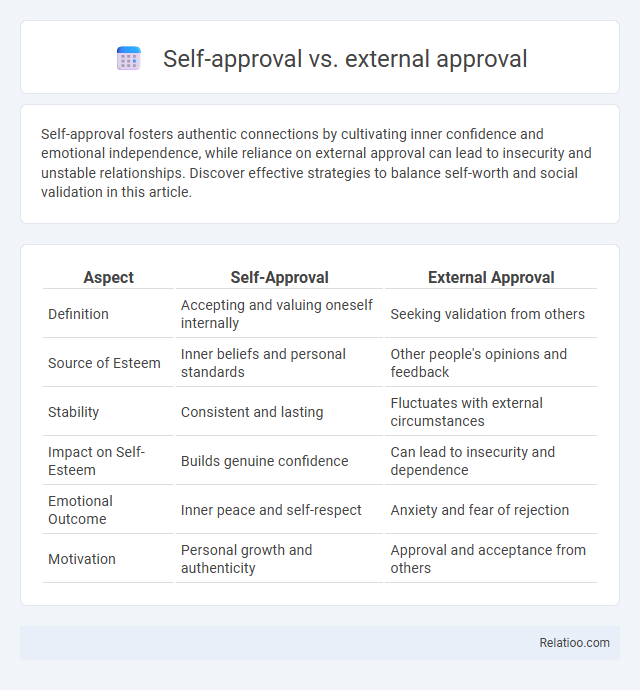Self-approval fosters authentic connections by cultivating inner confidence and emotional independence, while reliance on external approval can lead to insecurity and unstable relationships. Discover effective strategies to balance self-worth and social validation in this article.
Table of Comparison
| Aspect | Self-Approval | External Approval |
|---|---|---|
| Definition | Accepting and valuing oneself internally | Seeking validation from others |
| Source of Esteem | Inner beliefs and personal standards | Other people's opinions and feedback |
| Stability | Consistent and lasting | Fluctuates with external circumstances |
| Impact on Self-Esteem | Builds genuine confidence | Can lead to insecurity and dependence |
| Emotional Outcome | Inner peace and self-respect | Anxiety and fear of rejection |
| Motivation | Personal growth and authenticity | Approval and acceptance from others |
Understanding Self-Approval: What Does It Mean?
Understanding self-approval involves recognizing and accepting one's own worth without relying on external validation, which fosters authentic confidence and emotional resilience. Unlike external approval, which depends on others' opinions and can fluctuate, self-approval is an intrinsic sense of acceptance that promotes consistent mental well-being. Cultivating self-approval strengthens personal autonomy, reduces anxiety related to social judgment, and supports sustainable self-esteem development.
The Role of External Approval in Shaping Self-Worth
External approval significantly influences self-worth by providing social validation and feedback, which individuals often rely on to gauge their value and competence. The need for acceptance and recognition from others can shape self-perception, making external validation a powerful driver in developing confidence and self-esteem. Overdependence on external approval can undermine intrinsic self-worth, highlighting the importance of balancing internal self-acceptance with external feedback.
Psychological Foundations of Self-Validation
Self-approval stems from an intrinsic sense of self-worth and personal validation, reinforcing psychological resilience and emotional stability. External approval relies on recognition and acceptance from others, impacting self-esteem through social feedback mechanisms embedded in human cognitive processes. The interplay between self-approval and external approval forms the foundation of self-validation, critical for healthy identity development and psychological well-being.
Social Influences: Why We Seek Approval from Others
Seeking approval from others is deeply rooted in social influences, as human beings are inherently social creatures who rely on external validation to build self-esteem and gauge social acceptance. External approval often impacts behavior and decision-making because it provides a sense of belonging and security within social groups, influencing motivations and emotional well-being. Self-approval, while internally generated, frequently develops in response to social feedback, highlighting the interplay between individual self-evaluation and societal expectations.
Emotional Impact: Self-Approval versus External Validation
Self-approval fosters genuine emotional well-being by grounding your confidence in personal values and intrinsic worth, reducing dependence on fluctuating external opinions. External approval often leads to temporary validation but can create emotional instability when others' judgments vary or are withheld. Prioritizing self-approval enhances resilience and authentic self-esteem, while reliance on external validation risks anxiety and self-doubt.
The Benefits of Cultivating Self-Acceptance
Cultivating self-acceptance empowers you to rely less on external approval, fostering inner confidence and emotional resilience. This shift enhances your mental well-being by reducing anxiety linked to others' opinions, promoting authentic decision-making. Embracing self-approval creates a stable foundation for personal growth and lasting happiness.
Drawbacks of Relying on External Approval
Relying heavily on external approval can undermine your self-confidence and create dependency on others' opinions, leading to inconsistent self-worth. It can cause emotional instability as approval is often unpredictable and beyond your control. This dependency limits personal growth and authentic decision-making, as choices are driven by the desire to please others rather than your true values or goals.
Strategies to Strengthen Self-Approval
Strengthening self-approval involves cultivating intrinsic validation rather than relying on external approval, which can fluctuate based on others' opinions. You can develop strategies such as practicing self-compassion, setting personal goals aligned with your values, and regularly reflecting on your achievements to reinforce internal confidence. Building this foundation empowers consistent self-acceptance and reduces dependency on outside validation for approval.
Balancing Self-Approval and Healthy Social Feedback
Balancing self-approval and healthy social feedback is crucial for maintaining emotional well-being and authentic relationships. Your internal validation fosters confidence and resilience, while external approval provides valuable perspectives and social connection. Striking a balance ensures you remain true to yourself without isolating from constructive input that supports personal growth.
Building a Life Rooted in Inner Confidence and Authenticity
Building a life rooted in inner confidence and authenticity requires prioritizing self-approval over external approval, as relying on others' validation can lead to inconsistency and insecurity. Embracing your true values enables genuine fulfillment and resilience, fostering a stable sense of approval that comes from within. Your personal growth strengthens when you align decisions with internal beliefs rather than seeking approval from external sources.

Infographic: Self-approval vs External approval
 relatioo.com
relatioo.com